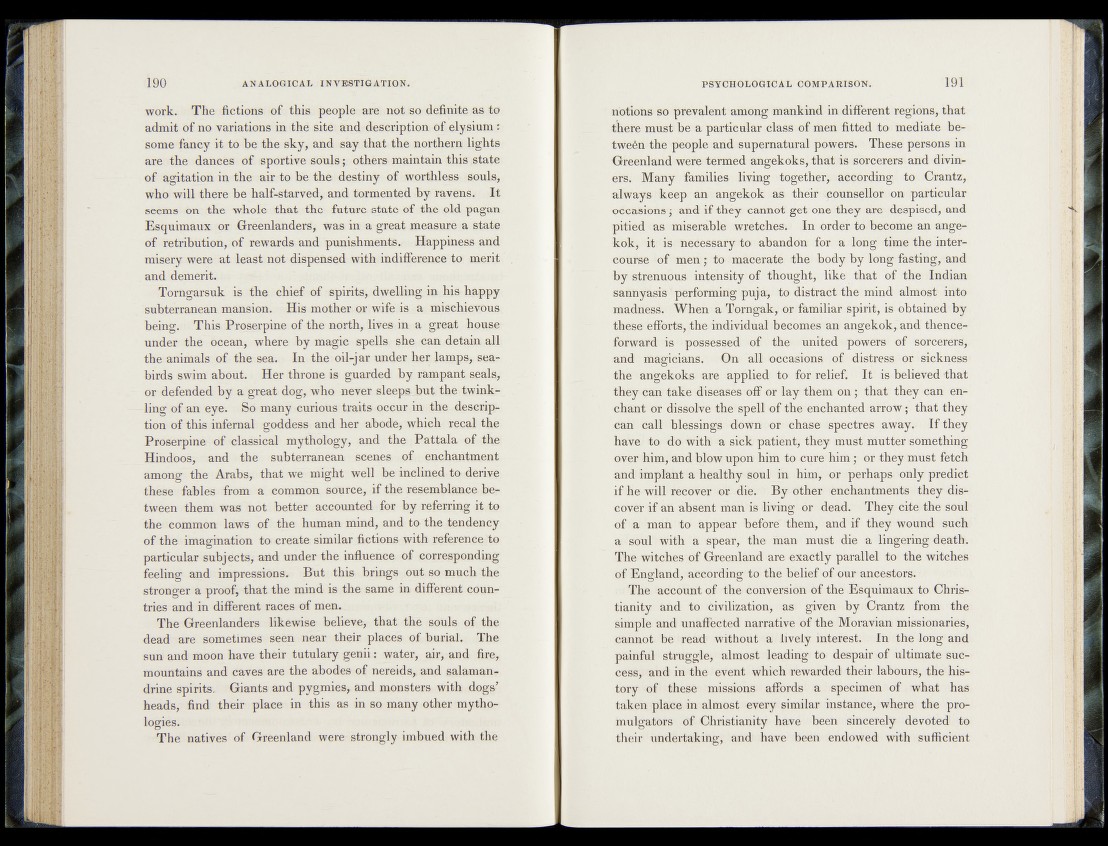
work. The fictions of this people are not so definite as to
admit of no variations in the site and description of elysium:
some fancy it to be the sky, and say that the northern lights
are the dances of sportive souls; others maintain this state
of agitation in the air to be the destiny of worthless souls,
who will there be half-starved, and tormented by ravens. I t
seems on the whole th a t the future state of the old pagan
Esquimaux or Greenlanders, was in a great measure a state
of retribution, of rewards and punishments. Happiness and
misery were at least not dispensed with indifference to merit
and demerit.
Tomgarsuk is the ehief of spirits, dwelling in his happy
subterranean mansion. His mother or wife is a mischievous
being. This Proserpine of the north, lives in a great house
under the ocean, where by magic spells she can detain all
the animals of the sea. In the oil-jar under her lamps, seabirds
swim about. Her throne is guarded by rampant; seals,
or defended by a great dog, who never sleeps but the twinkling
of an eye. So many curious traits occur in the description
of this infernal goddess and her abode, which recal the
Proserpine of classical mythology, and th e .P a tta la of the
Hindoos, and the subterranean scenes o f enchantment
among the Arabs, that we might well be inclined to derive
these fables from a common source, if the resemblance, her
tween them was not better accounted for by referring it to
the common laws of the human mind, and to, the tendency
of tóe imagination to create similar fictions with reference>>
particular subjects, and trader the influence of corresponding
feeling and impressions. But this brings out so much the
stronger a proof, th a t the mind is the same in different countries
and in different races of men.
The Greenlanders likewise believe, that the souls of the
dead are sometimes seen near their places of burial. The
sun and moon have their tutulary genii: water, air, and fire,
mountains and caves are the abodes of nereids, and salaman-
drine spirits. Giants and pygmies, and monsters with dogs’
heads, find their place in this as in so many other mythologies.
The natives of Greenland were strongly imbued with the
nations so prevalent among mankind in different regions, that
there must be a particular class of men fitted to mediate between
the people and supernatural powers. These persons in
Greenland were termed angekoks, that is sorcerers and diviners.
Many families living together, according to Crantz,
always keep an angekok as their ^counsellor on particular
occasions; and if they cannot get one they are despised, and
pitied as miserable wretches. In order to become an angekok,
it is necessary to abandon for a longs time the intercourse
of men; to macerate the body by long fasting, and
by strenuous intensity of thought, like that of the Indian
sannyasis' performing puja, to distract the mind almost into
madness. When a Torngak, or familiar spirit, is obtained by
tbeg© efforts, the individual becomes an angekok, and thence-
forward is possessed of the united powers of sorcerers,
and magicians. On all occasion© of distress or sickness
the angekoks are applied to for relief. It! is believed th a t
they can take diseases off or lay them o n ; that they can enchant
or dissolve the spell of the enchanted arrow; that they
can call blessings down or chase spectres away. If they
have to do with a sick patient, they must mutter something
over him, and blow upon him to cure him; or they must fetch
and implant a healthy soul in him, or perhaps only predict
if he-will recover ©r die. By other enchantments they discover
if an absent man is living or dead. They cite the soul
of a man to appear before them, and if they wound such
a soul with a spear, the man must die a lingering death.
The witches of Greenland are exactly parallel to the witches
of England, according to the belief of our ancestors.
The account of the conversion of the Esquimaux to Christianity
and to civilization, as given by Crantz from the
simple and unaffected narrative of the Moravian missionaries,
cannot be read without a lively interest. In the long and
painful struggle, almost leading to despair of ultimate success,
and in the event whieh rewarded their, labours, the history
of these missions affords a specimen of what has
taken place in almost every similar instance, where the promulgators
of Christianity have been sincerely devoted to
their undertaking, and have been endowed with sufficient